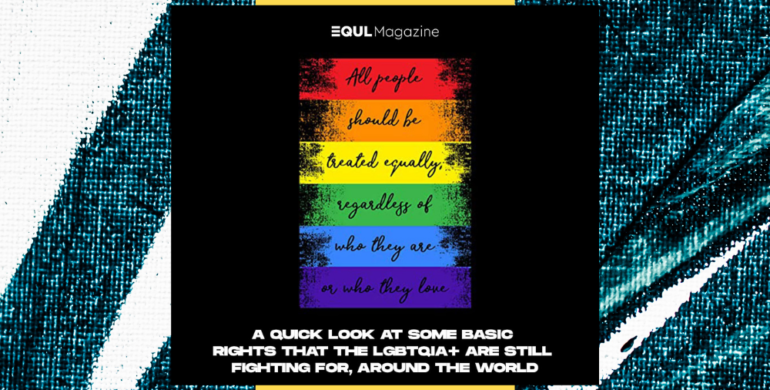A quick look at some basic rights that the lgbtqia+ are still fighting for, around the world
A quick look at some basic rights that the lgbtqia+ are still fighting for, around the world
Like my queer friends often express, being part of the LGBTQIA+ community in a straight world is exhausting. Not only because of an existing lack of inclusivity but a constant fight against bigotry and abuse, world wide.
Queer people continue to face violence and inequality, sometimes torture, even execution because of who they love. Sexual orientation and gender identity are integral aspects of our selves and should never lead to discrimination or abuse. Abuses based on sexual orientation and gender identity worldwide, including torture, killing and executions, arrests under unjust laws, unequal treatment, censorship, medical abuses, discrimination in health and jobs and housing, domestic violence, abuses against children, and denial of family rights and recognition.
Here’s a look at 3 basic rights that lgbtqia+ community is still fighting for, around the world.
Ban on anti gay laws and inclusion of anti discrimiatory laws:
Around the world, over 70 countries still criminalise same sex marriages.
Let’s take a look at Nigeria, for example. Due to the same sex marriage (prohibition) act (SSMPA) , Nigeria is far from being a country which is safe for the LGBTQIA+ community.
Even though it is an anti marriage act, this law has many consequences. It allows hate and bigotry to flourish and go unchecked. This law stops any work that non government organisations do for the community. The law forbids any cohabitation between same-sex sexual partners and bans any “public show of same sex amorous relationship.” The SSMPA effectively criminalizes lesbian, gay, bisexual, and transgender (LGBT) persons based on sexual orientation and gender identity.
Even India’s section 377 categorised same sex love to be an unnatural offence, a “carnal intercourse against the laws of nature”, until as recently as 2018.
But in order to truly undo the hate and bigotry created because of the law over the years, India is in need of an anti discrimination law just like the one in Manila.
Signed in October of 2020, The City Council of Manila described it as “an ordinance for the protection of the rights of lesbians, gays, bisexuals, transgenders, queers and intersex (LGBTQI) in the City of Manila against any and all forms of discrimination solely on the basis of sexual orientation, gender identity, expression (SOGIE) and providing penalty for violation thereof.”
Schools are not a safe space for LGBTQIA+ students
Dropping out of schools due to bullying of LGTQIA+ students is more common than you think.
Bullying occurs in schools as there is little to no awareness on same sex orientation and gender fluidity.
Trangender activist, Kalki Subraniam actually wrote a manual, “Teacher’s guide to non conforming students.” after facing discrimination from students and teachers. Kalki was stripped, made to dance on item numbers and molested.
Kalki is amongst the many who didn’t have a right to education. Unable to access a safe environment to learn, keeps the LGBTQIA+ from basic human rights.
Medical procedures enforced on transgender people
“Transgender” is an inclusive term for anyone whose sex assigned to them at birth does not conform to their lived or perceived gender. It refers to people for whom the designation as “female” or “male” on their birth certificate does not align with the gender that they identify with, are expressing or would express, if given a choice.
In Japan, being transgender is categorised as a mental heath disorder and in order to get legal recognition they must undergo sterilization. These medical procedures are harmful, expensive, invasive and irreversible.
The relevant legislation known as the “Gender Identity Disorder Special Cases Act” is contrary to international human rights law and international medical best practices. And while some trans people in Japan desire a diagnosis of “Gender Identity Disorder” (GID) and to undergo the medical procedures listed in the law, many do not—and should not be required to do so.
To be honest this article could very well become a book, just to accommodate the many injustices that the LGBTQIA+ community continues to face. The above is just a very quick glance at some of them.
The fight for equality cannot be on the shoulders of queer people alone.
For a better world, we’re all going to have to fight the fight.
Writer: Tarsha Kohli
There are no comments



